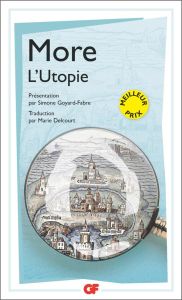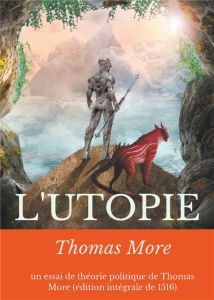UTOPIA - A SOCIO-POLITICAL SATIRE BY THOMAS MORE (UNABRIDGED TEXT)
MORE THOMAS
BOOKS ON DEMAND
Résumé :
Utopia (Libellus vere aureus, nec minus salutaris quam festivus, de optimo rei publicae statu deque nova insula Utopia) is a work of fiction and socio-political satire by Thomas More (1478-1535) published in 1516 in Latin. The book is a frame narrative primarily depicting a fictional island society and its religious, social and political customs. Many aspects of More's description of Utopia are reminiscent of life in monasteries.
Utopia was begun while More was an envoy in the Low Countries in May 1515. More started by writing the introduction and the description of the society which would become the second half of the work and on his return to England he wrote the "dialogue of counsel", completing the work in 1516. In the same year, it was printed in Leuven under Erasmus's editorship and after revisions by More it was printed in Basel in November 1518.
It was not until 1551, sixteen years after More's execution, that it was first published in England as an English translation by Ralph Robinson. Gilbert Burnet's translation of 1684 is probably the most commonly cited version. The work seems to have been popular, if misunderstood : the introduction of More's Epigrams of 1518 mentions a man who did not regard More as a good writer. The eponymous title Utopia has since eclipsed More's original story and the term is now commonly used to describe an idyllic, imaginary society.
Although he may not have directly founded the contemporary notion of what has since become known as Utopian and dystopian fiction, More certainly popularised the idea of imagined parallel realities, and some of the early works which owe a debt to Utopia must include The City of the Sun by Tommaso Campanella, Description of the Republic of Christianopolis by Johannes Valentinus Andreae, New Atlantis by Francis Bacon and Candide by Voltaire.
The politics of Utopia have been seen as influential to the ideas of Anabaptism and communism.[citation needed] While utopian socialism was used to describe the first concepts of socialism, later Marxist theorists tended to see the ideas as too simplistic and not grounded on realistic principles. The religious message in the work and its uncertain, possibly satiric, tone has also alienated some theorists from the work.
An applied example of More's Utopia can be seen in Vasco de Quiroga's implemented society in Michoacán, Mexico, which was directly inspired by More's work.
Utopia (Libellus vere aureus, nec minus salutaris quam festivus, de optimo rei publicae statu deque nova insula Utopia) is a work of fiction and socio-political satire by Thomas More (1478-1535) published in 1516 in Latin. The book is a frame narrative primarily depicting a fictional island society and its religious, social and political customs. Many aspects of More's description of Utopia are reminiscent of life in monasteries.
Utopia was begun while More was an envoy in the Low Countries in May 1515. More started by writing the introduction and the description of the society which would become the second half of the work and on his return to England he wrote the "dialogue of counsel", completing the work in 1516. In the same year, it was printed in Leuven under Erasmus's editorship and after revisions by More it was printed in Basel in November 1518.
It was not until 1551, sixteen years after More's execution, that it was first published in England as an English translation by Ralph Robinson. Gilbert Burnet's translation of 1684 is probably the most commonly cited version. The work seems to have been popular, if misunderstood : the introduction of More's Epigrams of 1518 mentions a man who did not regard More as a good writer. The eponymous title Utopia has since eclipsed More's original story and the term is now commonly used to describe an idyllic, imaginary society.
Although he may not have directly founded the contemporary notion of what has since become known as Utopian and dystopian fiction, More certainly popularised the idea of imagined parallel realities, and some of the early works which owe a debt to Utopia must include The City of the Sun by Tommaso Campanella, Description of the Republic of Christianopolis by Johannes Valentinus Andreae, New Atlantis by Francis Bacon and Candide by Voltaire.
The politics of Utopia have been seen as influential to the ideas of Anabaptism and communism.[citation needed] While utopian socialism was used to describe the first concepts of socialism, later Marxist theorists tended to see the ideas as too simplistic and not grounded on realistic principles. The religious message in the work and its uncertain, possibly satiric, tone has also alienated some theorists from the work.
An applied example of More's Utopia can be seen in Vasco de Quiroga's implemented society in Michoacán, Mexico, which was directly inspired by More's work.
18,00 €
Impression à la demande
Impression à la demande
Certains ouvrages sont imprimés à la demande par les éditeurs.
Ils sont signalés dans le site de cette manière:

Pour ces titres, un délai supplémentaire de 5 à 10 jours peut être nécessaire.
Les commandes de ces ouvrages sont réputées ferme.
EAN
9782322134229

Caractéristiques
| EAN | 9782322134229 |
|---|---|
| Titre | UTOPIA - A SOCIO-POLITICAL SATIRE BY THOMAS MORE (UNABRIDGED TEXT) |
| Auteur | MORE THOMAS |
| Editeur | BOOKS ON DEMAND |
| Largeur | 148mm |
| Poids | 185gr |
| Date de parution | 08/02/2019 |
| Nombre de pages | 368 |
| Emprunter ce livre | Vente uniquement |
Autres livres par l'auteur de " UTOPIA - A SOCIO-POLITICAL SATIRE BY THOMAS MORE (UNABRIDGED TEXT) " (MORE THOMAS)
-
 More Thomas - Goyard-Fabre Simone - Delcourt MarieL'Utopie. Ou le traité de la meilleure forme de gouvernement5,90 €
More Thomas - Goyard-Fabre Simone - Delcourt MarieL'Utopie. Ou le traité de la meilleure forme de gouvernement5,90 €
Dans la même catégorie ( SANS CATEGORIE )
Ma liste d’envies
Derniers articles ajoutés
Il n’y a aucun article dans votre liste d’envies.
- Commande avant 16h : Demain dans la boîte aux lettres !
- Livraison dès 3,50 €
- Retrait gratuit
- Paiement 100% sécurisé
4,6/5 - ⭐⭐⭐⭐⭐
2448 Avis - Source Google















